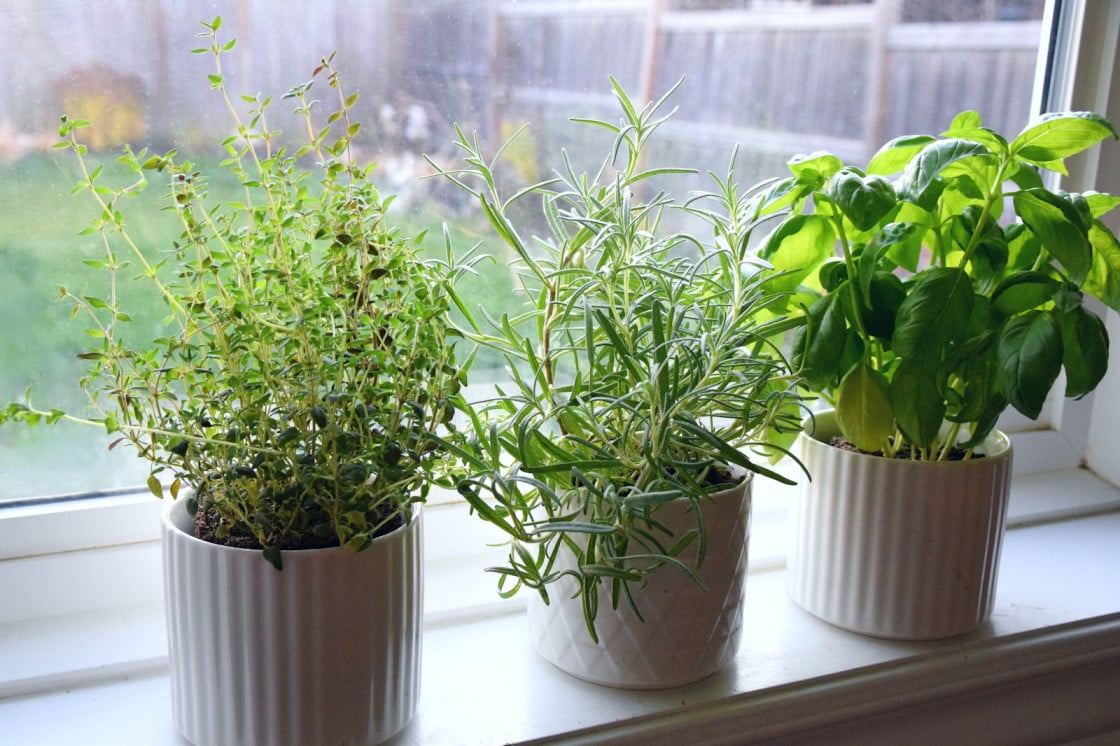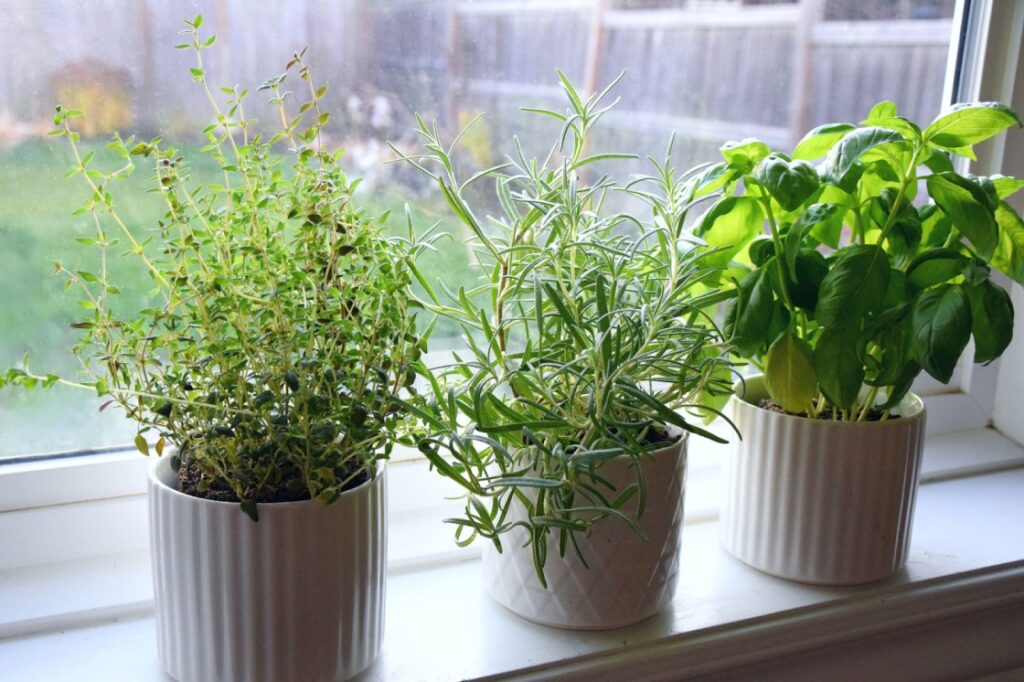
We live in a fast-paced world where we are surrounded by modern medicines. But there are herbs that will remind you of ancient wisdom that promotes well-being. Not only that there are numerous herbs to grow in your house to keep them handy and incorporate them in your daily meals. I have a list of herbs that I will share with you focusing on the parts that you can grow indoors and all year round so that you can access the goodness of those plants every season. There are herbs like rosemary and basil that will fill your indoors with a mild aroma. But note one thing before moving into the topic- some herbs are toxic to pets so it’s better to keep them away from them. Don’t worry I will mention below which ones are toxic for your pets.
1)Italian Basil:
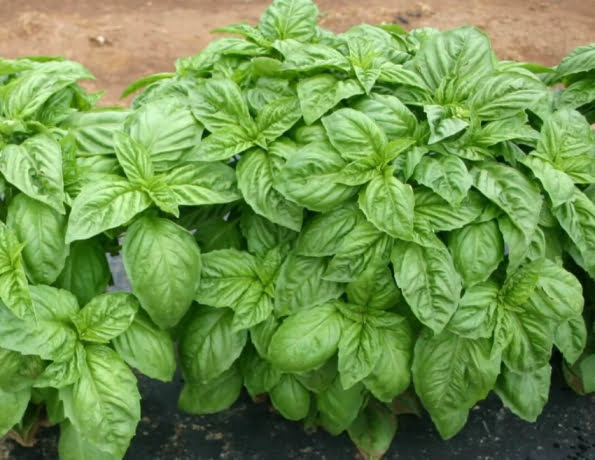
The Indian basil is a sacred herb of peace, improving immunity and reducing stress. Italian basil on the other hand is popularly used for cooking purposes. Basil is mainly used to make sauce, and many gardeners who love cooking Italian dishes find sweet basil is important to grow. As a perk, this annual can have decorative characteristics, too. Some types of basil have deep purple foliage and leaves that are ruffly.
Care:
- As soon as your basil gets about 5 inches tall, start pruning and pinching it frequently to keep it from flowering and fulfilling its life mission.
- A south-facing window in winter is ideal for the tree.
- Basil loves evenly moist soil. So the drainage should be good but not sharp so that it will run through the soil immediately.
Toxicity:
Basil is non-toxic to cats and dogs.
2) Lemon Balm:
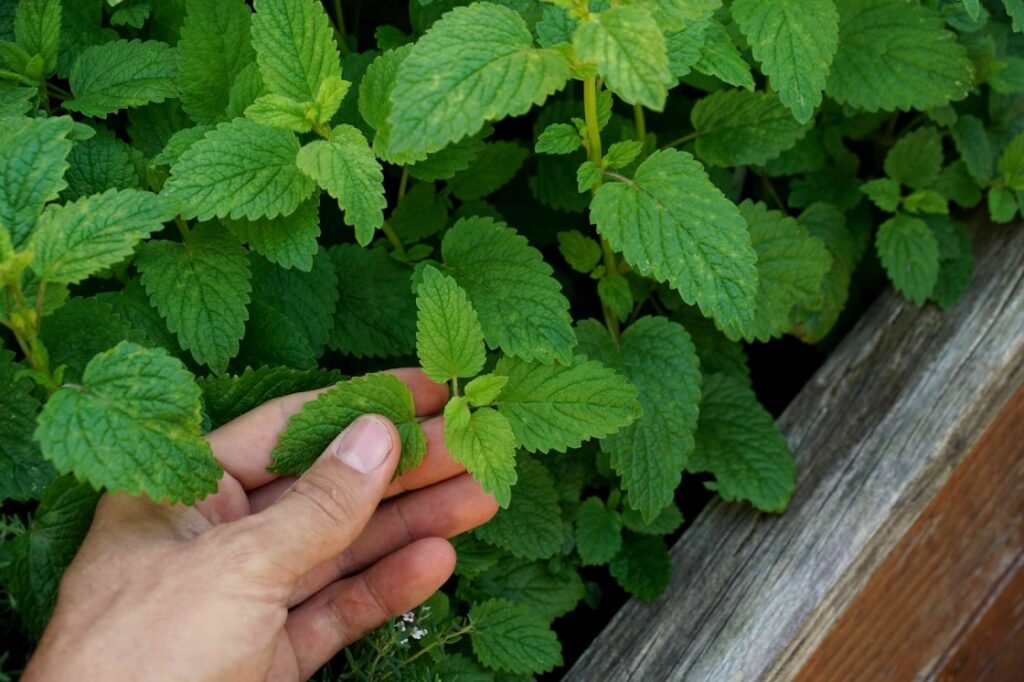
Lemon balm is mainly used in soups and salads to give a lemony feeling to the food without making it too sour. Many people even use it in dried form in potpourri to have a naturally fresh smell indoors.
Care:
- Start pruning and pinching it when they are around one foot tall.
- They need average water.
- The soil should be good at draining the extra water.
- For this plant, less fertilization is better.
- They are susceptible to fungal diseases, so make sure the air circulation around them is good, try to avoid pesticides and fungicides as you will consume them.
Toxicity:
They are considered non-toxic to pets.
3) Chives:
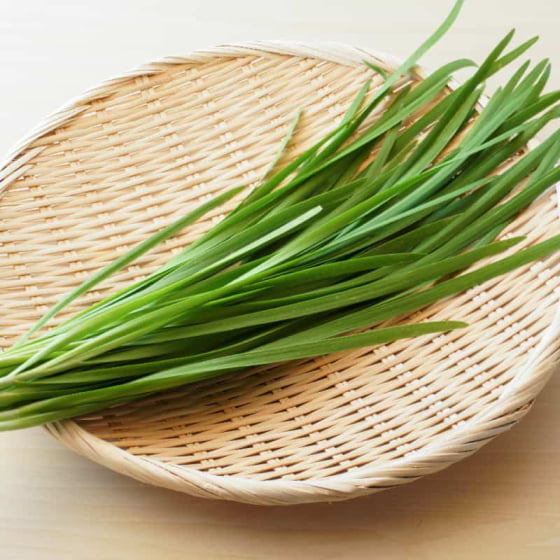
The chive plant is another easy-to-cultivate herb. They are mainly used for their light onion flavour. Indeed, It is connected to the familiar onion. Its grass-like foliage is popular in stews and salads. It also has one of the most beautiful blooms among the culinary herbs. The plant will multiply over time.
Care:
- They are usually grown in bunches in one pot. When they will grow enough, divide them.
- If you pull out one you will notice the bulblets at the end of them and also some roots. You can easily pull them apart and plant them separately.
- They require normal watering.
- You use all-purpose fertilizer occasionally for a boost of growth.
Toxicity:
Toxic to cats and dogs.
4) Mint:
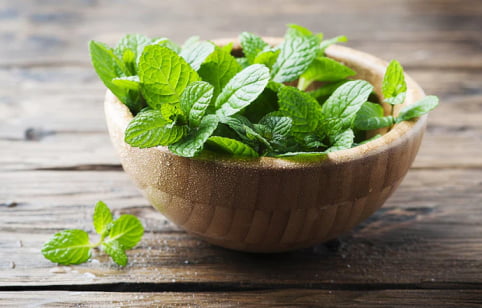
Mint is a natural option for indoor gardening as it can be cultivated anywhere all year long. There are quite a few types of mint and many more forms to utilize them; spearmint is great in spicy recipes and mojitos, and white chocolate mint and apple mint are excellent in sweet foods. Peppermints are as refreshments, used in candies and to make a refreshing tea.
Care:
- Needs rich soil and frequent watering.
- Put your mint plant around an east- or west-facing windowsill or in a place that gets constant sunlight.
- Grow mint in moist soil but it should be well-drained.
- Boost ideal leaf production by regularly providing a portion of water-soluble plant fertilizer.
Toxicity:
Mint is not safe for cats and dogs.
5) Parsley:
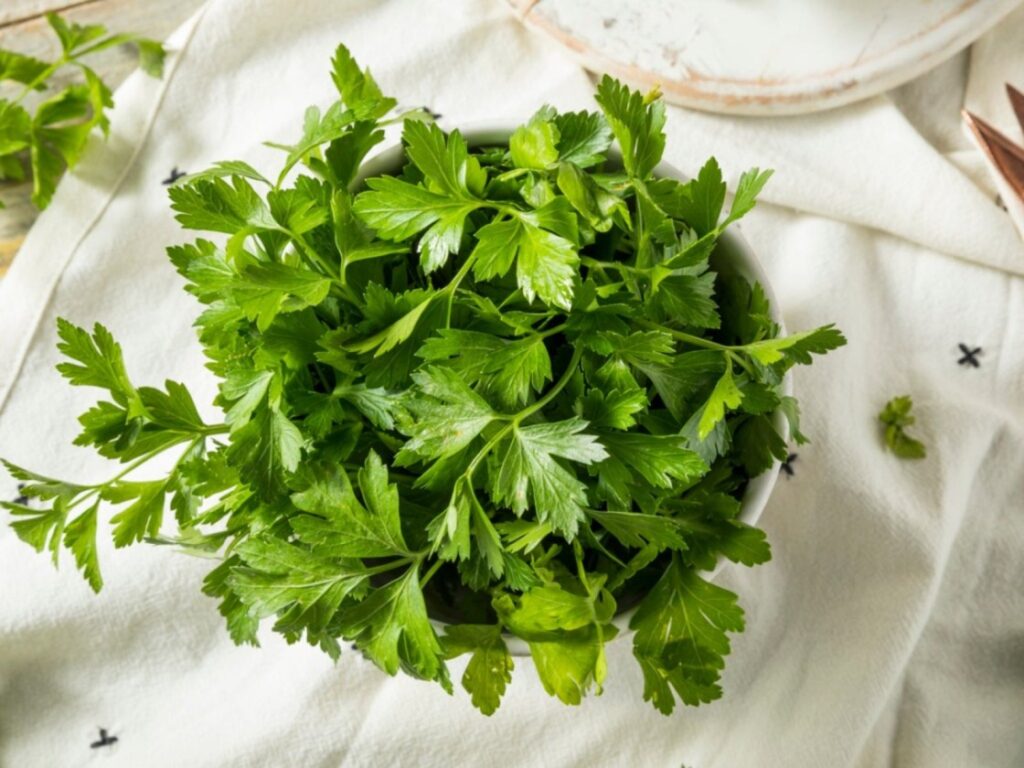
Select curly or flat-leaf, but do grow one in your kitchen garden. Parsley is not only used as a dish decorator, along with its vibrant color parsley will add flavor to any kind of spicy and savoury dish. It will give the oomph to your boring salad and will make it interesting. Parsley’s leaves, roots, and stems are also used for some medicinal conditions like kidney stones, stomach issues, and skin conditions.
Care:
- Parsley does best on even moisture but can suffer if they’re saturated in water.
- Parsley can be grown in water as well, but if you are growing them in water make sure to water them regularly.
- parsley thrives in a sunny location that acquires direct light for 4 to 6 hours a day.
Toxicity:
Considered as toxic to cats and dogs.
6) Dill:
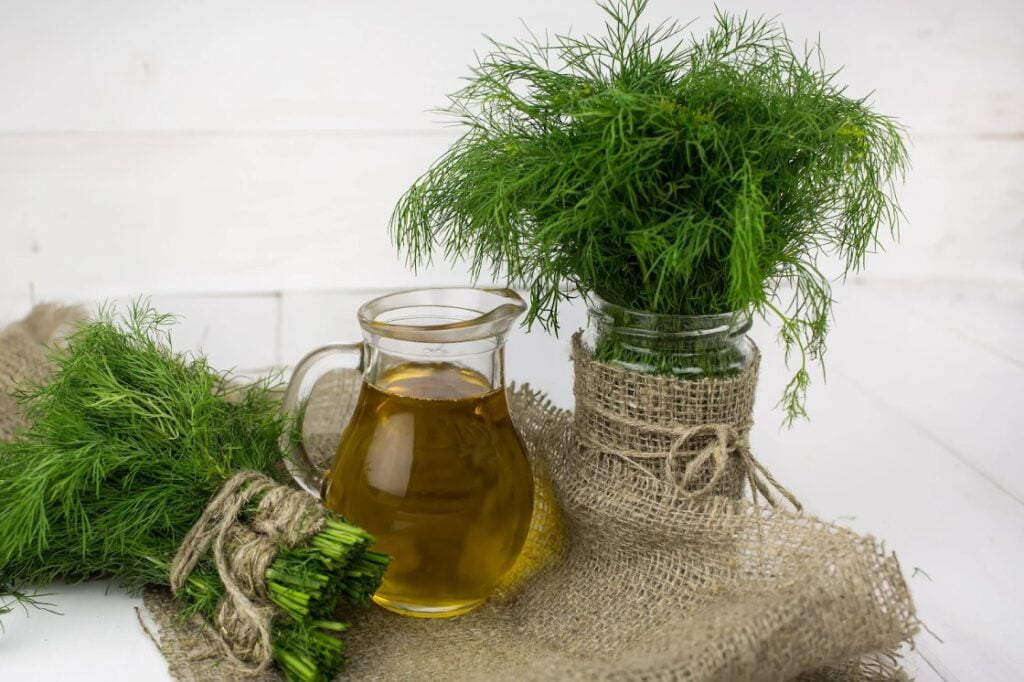
Not only is dill a signature element in pickled dishes, but it’s vibrant and grassy with a mixture of celery and fennel-like taste that provides punch to salads, stews, sauces, and dips.
Care:
- Choose a tiny variety like ‘Fernleaf’, which is perfect for small herb pots.
- Place it near a well-lit window with evenly moist soil.
- When it produces flowers and then seeds, it will eventually stop producing leaves. If you want to leave only, they pinch the end of the stems and leaves frequently to make sure it doesn’t produce flowers. Its seeds and flowers are edible too. You cultivate the seeds as well to maximise the number of the plants.
Toxicity:
Completely non-toxic to pets.
7) Cilantro:
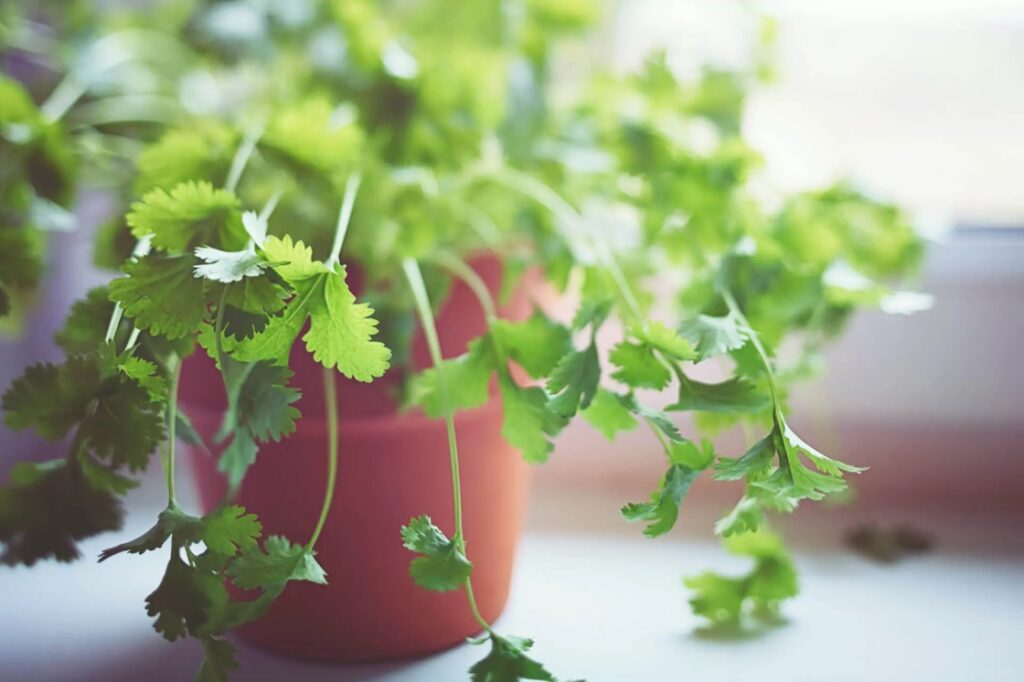
Cilantro is a flavorful herb that gives life to dishes with a fresh, citrusy taste. Used in recipes all around the globe, it’s a cherry on the top in salsas, dressings, pestos, and dips. Cilantro is a fast-growing plant that will survive in your kitchen garden for a few months easily.
Care:
- Because it tends to bolt; once it blooms, it turns bitter.
- Cilantro’s life can be expanded by pinching it back frequently.
- Plant cilantro in a pot, about 14 inches wide and 10 inches deep, which allows control of water and humidity, and position it in a spot that’s well-lit or has access to morning sun. Aim for an east-facing window.
Toxicity:
It is safe for both cats and dogs.
8) Lemongrass:
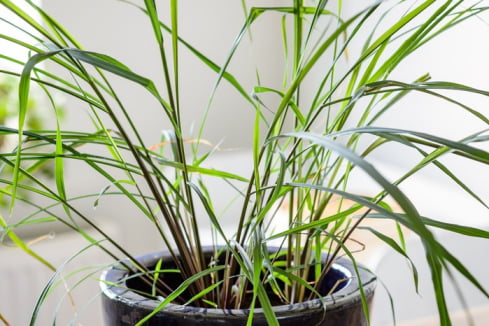
The stalks of lemongrass are heavily used in stews, side dishes, dressings, marinades, hot drinks, and cocktails for their savoury, lemony-ginger taste. Native to Sri Lanka and India, lemongrass is an aromatic, decorative herb that can extend up to 5 feet tall and 4 feet wide.
Care:
- The plant is hardy to zones 10-11, it can also be developed as an annual in cooler temperatures.
- Place it in a sunny, well-lit area indoors.
- keep it watered properly.
Toxicity:
They are mildly toxic to pets.
9) Thyme:
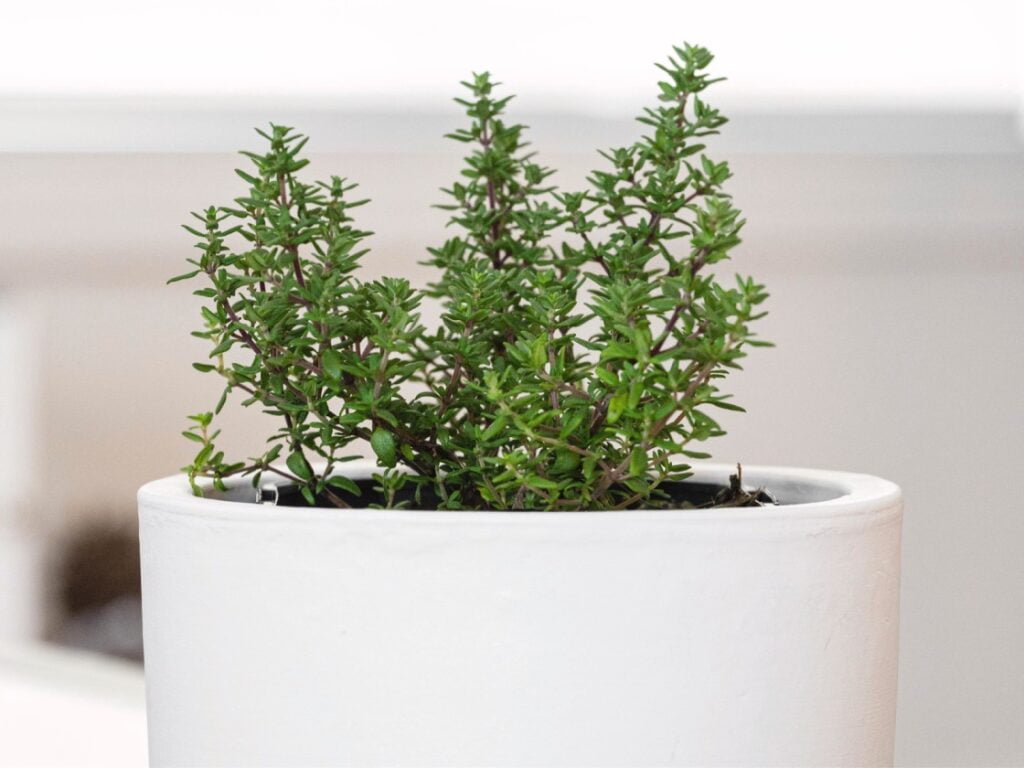
Thyme is excellent for spicing up a variety of kinds of meat. In addition to the kinds of thyme used primarily for culinary intents, there are also types of this perennial employed in landscaping as a ground covering. Under the right circumstances, the red mother of thyme, so called for its bloom shade, can be particularly showy.
Care:
- It likes low humidity.
- So it is inappropriate for a kitchen plant, but you can grow it in any drier place in your home.
- Make sure the plant can receive good light.
- Thyme will prefer drought more than getting overwatered.
Toxicity:
These are safe for dogs and cats.
How to Grow Your Herbs Indoors?
You can grow herbs easily from cuttings and seeds. You just need to follow some simple steps;
- Begin with your herbs (seeds or cutting) indoors in early spring. Spring is the most suitable time to plant herbs because that’s when they’ll be in their most active growing season.
- Prepare the pots with a potting medium and place them in a well-lit window.
- Cultivate your seeds or transplant cuttings that have developed roots in water. You need to keep a moist environment around it, so I will advise you to cover it with a plastic bag for a few weeks at the beginning.
- Once they’ve produced two sets of leaves or the cuttings have produced the roots in the soil, you can transfer them from their humid setting and plant them in their permanent place.
Growing an herb garden is easy and can be done by amateurs as well. So, pick your gardening tools and start your herb garden as soon as possible. If you have any questions regarding this topic, you can reach out to us, we will be happy to guide you through it.

